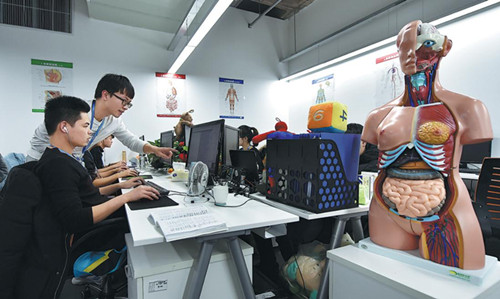Big data application helps produce digital healthcare industry guide


Medical records are collected into a big data system developed by LinkDoc, an artificial intelligence and big data medical solution provider, in its branch company in Tianjin. The high-end medical equipment industry is developing fast in Tianjin, with its revenue reaching 2.5 billion yuan in 2017. [Photo/Xinhua]
As the application of artificial intelligence in China's healthcare industry is booming, a growing number of AI companies are banking on the rising demand in the sector.
Last year, Firestone Inventing, a consulting company specializing in the medical industry, launched a digital healthcare map, the first such product in China to present statistics about healthcare industry development in a specific location.
Statistics include information about different types of medical enterprises, innovative demonstration areas, local high-end talents and the latest medical products, as well as the financing conditions in the region.
Firestone said the company had adopted medical data from more than 100,000 data collection points in 635 official data sources around the world by March, covering 2.29 million startup companies, 60,000 research institutes and 50,000 investment organizations.
Meanwhile, its database manages information about more than 14 million patents, 2.3 million medical products, 10 million entrepreneurs, 220,000 clinical trials and 20 million documents.
"We launched this digital map to provide industrial development suggestions and road maps to the government and industrial parks, enterprises as well as financial institutions. Using big data, users can get a clear layout about the development of the healthcare industry in a certain region," said Yang Hongfei, founder and CEO of Firestone.
"For the government and industrial parks, they can have a precise positioning about their regional planning, including how to invite investment and attract talents, while for medical companies, the statistics contribute to their research and development and are beneficial to industry collaboration.
"We joined hands with pharmaceutical company MSD last December, offering AI-based medical guidelines on respiratory diseases to serve MSD's doctors and R&D team. In the future, we will also present our big data to companies in other medical fields such as diabetes," Yang said.
Right now, Firestone has not included data acquired from patients, considering that there is no legislation to protect patients' privacy yet.
"If related law exists, we are willing to accumulate information from patients into our database, to promote innovation and entrepreneurship and better serve the patients," Yang added.
Chen Qiaoshan, a medical analyst at Beijing-based internet consultancy Analysys, said the application of AI in the country's healthcare sector is promising.
"Artificial intelligence is highly effective, and it relieves burdens from humans, making up for the lack of physicians," Chen said.
"However, problems still remain. Data collection is a fundamental problem because China has not established a complete electronic healthcare record system. Besides, acquiring high-quality healthcare information is difficult, given that there is no established law in the sector.
"According to the State Council's latest guideline, law on clarifying the right of using medical data will be drafted by 2025, which leaves time for the AI companies to get prepared," Chen added.
MOST POPULAR
- 1 China to continue opening up its mega-market to world: premier
- 2 Policies concerning expats, foreign enterprises in November 2025
- 3 China to enhance convenience for inbound tourism: minister
- 4 Departure tax refund applications surge 285% as inbound tourism rebounds
- 5 China's foreign trade up 3.6% in first 11 months of 2025







